Bulgaria’s housing market - getting better
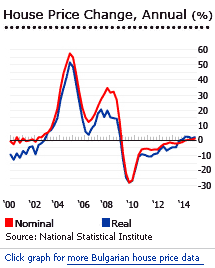 Bulgaria’s housing market continues to recover. Property demand is increasing. Investor confidence is up. The recovery is particularly strong in Sofia.
Bulgaria’s housing market continues to recover. Property demand is increasing. Investor confidence is up. The recovery is particularly strong in Sofia.
In the third quarter of 2015, the nationwide house price index dropped 0.5% (-0.2% in real terms) from the previous quarter, according to the National Statistical Institute (NSI).
- Prices of new dwellings increased 0.8% (1.1% in real terms) q-o-q in Q3 2015
- Prices of existing dwellings fell by 1.4% (-1.1% in real terms) q-o-q in Q3 2015
Though this may not look like a recovery, two things must be noted. First, in Sofia, Bulgaria’s capital, apartment prices rose 6% to €790 per square meter (sq. m.) in 2015 from the previous year, according to the real estate firm Bulgarian Properties. In fact in Q4 2015, the average price of apartments exceeded €800 per sq. m. for the first time since 2011.
“2015 brought an upturn of the real estate market in Sofia. Not only the buyers have returned to the market, but also we have witnessed a growing trust in the real estate market and the properties as an investment asset,” says Polina Stoykova of Bulgarian Properties.
Second, while NSI house price figures (the official figures) remain subdued, unofficial figures suggest that the Bulgarian housing market was in an upswing in 2015.
From 2000 to 2008, Bulgaria had a house price boom, with residential property prices surging around 300%. The bubble burst at the end of 2008:
- In 2009, Bulgaria’s average dwelling price plummeted by 26.31% (-26.72% in real terms);
- In 2010, the average dwelling price fell by 5.58% (-9.68% in real terms);
- In 2011, the average dwelling price fell by 6.16% (-8.67% in real terms);
- In 2012, the average dwelling price fell by 1.4% (-5.42% in real terms);
- In 2013, the average dwelling price fell 1.21% (but increased 0.38% in real terms);
- In 2014, the average dwelling price increased 1.15% (2.05% in real terms).
Bulgaria’s property market is expected to strengthen further this year. Demand for properties in the major cities will grow, and the supply will become increasingly limited due to the low levels of new construction, according to local property experts. Moreover, property prices are expected to increase by about 7% this year from a year earlier, according to Bulgarian Properties.
“An important element of the new market reality is the return of the confidence in the property market. More and more buyers are thinking of buying property because real estate is a safe real asset and good investment,” Stoykova stated. “It is clear and obvious that the buyers have permanently returned,” Stoykova added.
European Union citizens can now purchase properties in Bulgaria, including land. The 5-year moratorium on land purchases, set as a condition in the Accession Treaty between Republic of Bulgaria and The European Union, was lifted in January 1, 2012.
Previously, foreigners could purchase land only in the name of a legal entity and were not allowed to own a property. The lifting of the ban now gives European citizens the right to own property as individuals.
Demand for property is picking up again
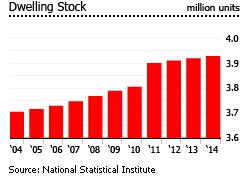
Property transactions in Bulgaria, particularly in Sofia, continue to pick up. In the fourth quarter of 2015, the number of completed deals in Sofia rose by 8.1% to 7,541 registered deals as compared to the same period last year, according to Bulgarian Properties. For the whole year of 2015, the number of registered sales in the capital surged by 17% to 24,379 deals.
“Investors are now clearly back, we have again started talking about capital gains and rental returns, the interest towards buying properties in new developments off-plan has also increased,” says Stoykova.
Smaller apartments were the most sought after properties in 2015. One-bedroom apartments represent about half of all property sales while two-bedroom apartments represent around 35%, according to Bulgarian Properties. There is also an increasing interest in studios, which are becoming more attractive as rental income investments. Studios represent around 8% of the sales in Sofia in 2015. Most of the property sales were purchased on a cash-basis.
In 2015, the average number of days on the market before a residential property is sold stood at 63 days, sharply down from 104 days in 2014, 97 days in 2013, and 121 days in 2012, according to Bulgarian Properties. The significant decline in the time it takes to sell a residential property implies an increased investor confidence since homebuyers are now making their purchase decisions much faster.
Most sought-after locations
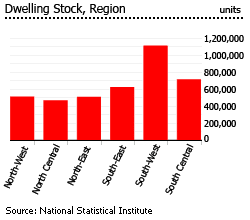
Sofia’s Southern districts remain the most preferred location by homebuyers. The average house price in the Southern districts stood at €830 per sq. m. in 2015. In Lozenets and the city center, demand remains high despite that fact that these locations have the highest property prices in the country, which range from €1,100 to €1,200 per sq. m. in 2015.
The Hladilnika and Krastova vada districts, particularly along the Cherni Vrah Boulevard and around the Paradise Center shopping mall, are also popular locations among the homebuyers. These locations are popular because of their amenities, trade centers, improved infrastructure, proximity to Vitosha Mountain and the future opening of metro stations.
Other preferred districts also include Studentski grad and Vitosha because of the availability of newly-built homes at affordable prices. The average price of dwellings in these locations was €730 per sq. m. The different parts of Mladost district are also popular among homebuyers.
The cheapest apartments were in the districts of Druzhba, Suhata reka, and Levski, at an average price of €580 per sq. m. in 2015.
Residential construction activity has fallen
In 2015, the number of newly-built dwellings plunged by 18.6% from a year earlier, to 8,137 units, according to the National Statistical Institute (NSI). From 2005 to 2011, dwellings completed averaged 16,700 units every year. Construction peaked in 2009 when dwellings completed exceeded 22,000 units. However, dwellings completed fell sharply to an average of 9,700 units from 2012 to 2014.
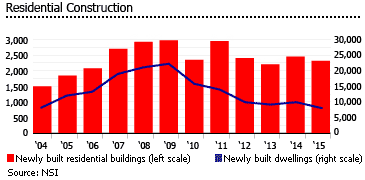
Likewise, the number of newly-built residential buildings fell by 5.6% y-o-y in 2015, to 2,316 buildings, in contrast with the 11.5% annual rise seen in 2014.
As of December 2014, the country’s total dwelling stock stood at 3,927,769 units, up slightly by 0.2% from a year earlier, according to the NSI. Two- and three-bedroom dwellings represent about 32.7% and 33.3% of the total dwelling stock in Bulgaria. The South-West region accounted for the largest share in dwelling stock in 2014, at 28.2%, followed by the South-Central region (18.1%), South-East region (15.8%), North-West region (13%), North-East region (12.9%), and North-Central region (11.9%).
Low interest rates
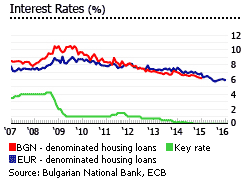
Interest rates in Bulgaria continue to decline. The average mortgage interest rate for BGN-denominate loans fell to a record low of 5.29% in January 2016, from 6.18% in January 2015, and 6.97% in the January 2014, according to the Bulgarian National Bank.
For BGN-denominated loans, in January 2016:
- Interest rate fixation (IRF) of up to 1 year: 5.29%, down from 6.18% a year ago and 6.99% two years earlier
- IRF over 1 and up to 5 years: 5.29%, down from 5.9% in January 2015, and 6.17% two years ago
- IRF over 5 and up to 10 years: 5.23%, down from 6.74% a year earlier
- IRF over 10 years: 5.34%, down from 6.22% a year earlier
Likewise, the average mortgage interest rate for Euro-denominated loans also fell to 5.9% in January 2016, down from 6.83% in January 2015 and 7.59% in January 2014.
Over the same period, for Euro-denominated loans:
- IRF of up to 1 year: 5.96%, down from 6.93% a year earlier and 7.53% two years ago
- IRF over 1 and up to 5 years: 6.16%, down from 6.93% a year earlier and 6.91% two years earlier
- IRF over 5 and up to 10 years: 5.85%, down from 6.5% a year ago
- IRF over 10 years: 4.52%, down from 6.59% a year ago
Small mortgage market
Bulgaria’s mortgage market expanded during the boom years from just 0.38% of GDP in 2000, to 12.11% of GDP in 2010. However, it has been gradually declining in recent years, mainly due to weak credit demand. In 2015, the size of the mortgage market was equivalent to 10.43% of GDP, slightly down from 10.65% in 2014.
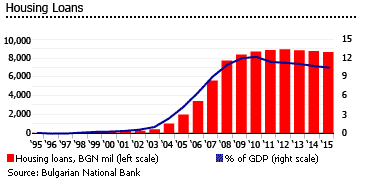
The total amount of outstanding housing loans dropped 0.7% y-o-y to BGN8.63 billion (€4.41 billion) in February 2016, despite record-low interest rates, according to the Bulgarian National Bank.
Moderate rental yields
Sofia has moderate gross rental yields - i.e., the rental return on a property if fully rented out, before all expenses. Yields in the centre are around 4.7% to 5.7%, based on recent Global Property Guide research conducted in August 2015. Yields in the suburbs are a little higher, between 5.35% and 6.35% over the same period.
Doctor’s Garden, Ivan Vazov, Iztok and Lozenets are among the most sought after addresses in the centre. Embassies, museums and universities are located here. These areas also have many parks and green spaces, making them popular with expats.
In the southern part of Sofia in Vitosha Mountain (or in the vicinity) are prestigious suburban neighborhoods like Boyana and Dragalevtsi. Though new developments being built here are increasing the stock of rental apartments, we find better yields here on the very smallest apartments, with yields stretching up to 6.4%. Last year we found that the very biggest apartments command exceptional yields at 8.4%.
Modest economic growth
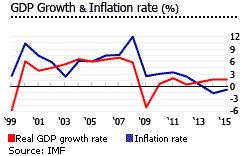
Bulgaria’s economy expanded by 2.2% in 2015, after growing by 1.7% in 2014, 1.1% in 2013, 0.5% in 2012, and 2% in 2011, mainly due to higher net exports and public investment, according to European Commission.
The economy was projected to grow by 1.5% this year and by another 2% in 2016, based on the latest forecast released by the European Commission. The economic slowdown this year is mainly due to the expected decline in public investment caused by the slowdown of the implementation of projects co-funded by the European Union.
Bulgaria’s general government deficit is projected to decline to 2.3% this year and further to 2% in 2017, according to the European Commission. In 2015, the country’s consolidated budget deficit fell to 2.9% of GDP, down from 3.7% of GDP in 2014. On the other hand, public debt is expected to increase from 28.2 % last year to 29.7 % in 2016 and further to 30.7 % next year.
The country had negative inflation of -0.9% in November 2015, down from -1.6% in 2014, according to the NSI. Deflation is still expected throughout most of 2016.
In Q3 2015, unemployment rate was 8.3%, down from 9.9% the previous quarter and 10.8% during the same period last year, according to the NSI.
Unemployment is expected to stand at about 9.4% in 2016 and at 8.8% in 2017, according to the European Commission.